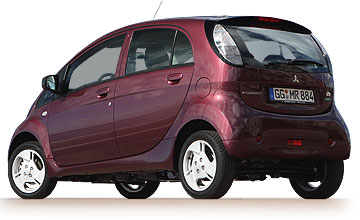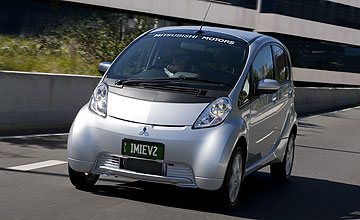Mitsubishi / i-MiEV / 5-dr hatch

Our opinion
 We like
We like
Performance, silent running, cheap ‘refuelling’, interior space
 Room for improvement
Room for improvement
Range anxiety, handling, basic interior with hard surfaces, no steering wheel adjustment, high price
WITH the first commercially available electric car in Australia parked in your driveway, it’s hard not to feel like the automotive pioneers of the late 19th Century.
As much as it is simple to drive and running costs are very small, you quickly experience the reality of “range anxiety”.
Just as those pioneer drivers must have been preoccupied with the daily challenge of how and where they would be able to refuel their innovative horseless carriages, so you inevitably concern yourself with where and when you might be able to next recharge your Mitsubishi i-MiEV electric car.
For a start, it’s not quite as easy as the car-makers would like us to believe – at least at this stage of EV infrastructure development.
You can’t just park your EV in the garage and plug it into a regular power socket, for a start. They are only 10 amps and you need a 15-amp power supply. Bugger!
And that 15-amp outlet at the factory? No, sorry. That has a regular Aussie three-point socket and, while the i-MiEV’s umbilical cord has a three-point pin alright, the earth pin is too big to fit in our plug. I guess we could have filed it down, but we didn’t think our friends at Mitsubishi would appreciate that.
People experienced with similar compatibility problems with caravans and caravan parks tell me they make their own short adapter leads using plugs from a hardware store, but we didn’t like the idea of risking a rare and expensive car with such a bush mechanic lash-up.
And, despite companies like Better Place having talked about hundreds of charge points and battery-swap stations being installed in our major cities, it has yet to happen – at least in Melbourne – and goodness knows when it will.
Sure, we could have taken it back to the Eastside Mitsubishi dealership and used their specially installed plug, but we could think of better things to do than spend seven hours sitting in their waiting room for it to recharge.
And all that talk about quick-chargers? Well, now you’re talking about a mini power station and apparently every time you use one it shortens the life-expectancy of the battery pack, which of course represents a major cost when it inevitably comes time for replacement.
Here at GoAuto, it’s probably worth our while spending a few hundred dollars to get a suitable power supply hooked up, but of course that will not suit everyone. You would hardly want to install one in a rental property, for instance,
So what did we do for our test? Sorry, but we copped out. We booked the car for just four days instead of the usual week and planned to keep our mileage down so we could simply return the i-MiEV before the battery died.
With a quoted range of up to 160km (depending on driving style), we thought a schedule of 120km would realistic but in the end the warning lights started flashing after about 80km and by the time we got the i-MiEV back to the dealer it had done little more than 90km and was on the verge of going into limp-home mode.
We know of one other journo who took the car for a country drive and turned back just before the charge level reached halfway, but there was a headwind on the return drive that sent the gauge tumbling and he was seriously nervous about making it back. Talk about range anxiety.
These are the realities of EVs currently (if you’ll excuse the pun). There is no problem with the cars themselves, but the reality of ownership seriously constricts uptake. It’s all very well for a council or university to install the appropriate recharging equipment, but if there is to be an electric future then widespread infrastructure is essential.
Of course, it’s a classic supply and demand conundrum.
Getting back to the good news on the i-MiEV – and other EVs – is that it is very user-friendly in terms of operation. My girlfriend was able to jump in and drive the i-MiEV to the shops with only minimal instruction and loved the experience.
We’ve driven the i-MiEV before, but there’s a big difference between a two-kilometre sample with a technician sitting alongside and a proper test where you jump in and drive away for the best part of a week on your own. This was like being thrown the keys by Karl Benz.
Not that there is a proper key with the i-MiEV. You just turn the dummy key in the steering column and … nothing. Just a little click and ‘Ready’ light to tell you the car is set to go.
Push the throttle and the i-MiEV smoothly eases away with a subtle electric motor hum; push a little harder and the car accelerates briskly, thanks to considerably more torque than you would expect from an equivalent petrol-powered city-car.
Although there is little engine noise, and not much wind noise either, 100km/h on the freeway feels faster than that. Yet the little i-MiEV handles it easily and cruises comfortably. It is speed-limited to 130km/h but is apparently capable of reaching 160km/h.
With a familiar auto-style P-R-N-D T-bar shift for the single-speed transmission, driving around town is just like driving any other city-car, only quieter, smoother and faster (though making the most of the latter significantly reduces the range).
In fact, it is so quiet – especially when you’re stopped at the lights – that you become very aware of surrounding noises, like the radio in the car next to you or even pedestrians’ conversations.
Unfortunately, Mitsubishi’s usual annoying seatbelt reminder is still present so you get nagging chimes as soon as you turn the key, even before you take off.
Engine braking is quite severe (in a good way), so you hardly need to use the brake pedal - even in regular Drive mode, let alone the special ‘Brake’ setting on the transmission that increases the braking effect and power regeneration.
Ride quality is very good – probably better than regular cars of the same size because the i-MiEV is much heavier – but the same cannot be said of the handling. The narrow motorcycle-style tyres might have low rolling-resistance, but they look like a joke and provide precious little lateral grip, even in the dry. We’re glad we didn’t get to try it on a slippery wet surface.
Despite being smaller than light cars like the Toyota Yaris and only marginally bigger than a Smart, the i-MiEV’s tallboy styling – courtesy of Frenchman Olivier Boulay – provides more interior space than you might expect and there’s actually plenty of room in the back seat for carrying adults.
However, interior comfort is hardly the i-MiEV’s strong suit and is more in keeping with an ecobox costing $12k than the $48,800 demanded here.
The seats are flat and have little side support – not that there’s much lateral force to deal with! – but at least those in the rear have quite long squabs and provide good thigh support.
The plastics are quite hard and dull, there are few pockets, compartments or cupholders, and there is no steering wheel adjustment at all, not even height.
On the plus side, the instrumentation is quite neat, with a central digital speedo surrounded by an arched economy gauge to help you extend that battery range, flanked by ‘Mickey Mouse ears’ that show the ‘fuel’ level on the left and trip info on the right.
Considering its price, the i-MiEV is only reasonably well-equipped, with automatic climate-control and sat-nav, although the latter regularly froze on us for no apparent reason, which was quite annoying. And there’s no cruise control.
Visibility is very good, helped by the steeply sloping windscreen that provides a sneaky little peep window between the A-pillar and side mirror so you get a reasonable view of traffic islands and corner apexes.
Overall, the i-MiEV is surprisingly easy to drive and live with. It is a tribute to Mitsubishi and a significant milestone in automotive history. Of course, range anxiety at this point is a reality, but nobody expects EVs to be for everybody at this stage of their development.
Right now, the i-MiEV appears like something out of Futurama, but to the next generation it will seem as modern as Karl Benz’s moustache.

No comments:
Post a Comment